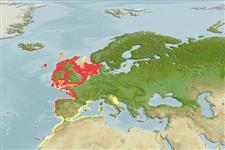>
Gadiformes (Cods) >
Gadidae (Cods and haddocks)
Etymology: Trisopterus: Greek, tris = thrice + Greek, pteron = wing, fin (Ref. 45335).
More on author: Linnaeus.
Environment: milieu / climate zone / depth range / distribution range
Ecologia
marinhas; estuarina bentopelágico; oceanódromo (Ref. 51243); intervalo de profundidade 30 - 100 m (Ref. 3663). Temperate; 62°N - 25°N, 19°W - 16°E
Northeastern Atlantic: from Norway to Morocco incl. British Isles and offshore islands, and Skagerrak, and in the western Mediterranean Ref. 1371, 90172).
Length at first maturity / Tamanho / Peso / Idade
Maturity: Lm 22.1, range 21 - 25 cm
Max length : 46.0 cm TL macho/indeterminado; (Ref. 7034); common length : 30.0 cm TL macho/indeterminado; (Ref. 1371); Idade máx. registada: 4 anos (Ref. 1371)
Espinhos dorsais (total): 0; Espinhos anais 0. Chin barbel well developed. Pelvic fins with slightly elongated anterior rays. Body light brown dorsally, relatively tall, grayish on the sides becoming silvery ventrally, with four or five broad indistinct transverse bars on the sides; a dark blotch at the upper edge of the pectoral-fin base (Ref. 1371). Eye diameter as snout length. Anus lies below the middle of the first dorsal fin (Ref. 35388).
Gregarious fish; immature ones often occur in large schools. Lives mostly on the outer shelf, but moves inshore to depths of 50 m or less for spawning. Feeds on benthic crustaceans but also on small fish, mollusks and polychaetes (Ref. 3663). Caught as a bycatch, used as food fish (Ref. 35388).
Oviparous, sexes are separate (Ref. 205).
Cohen, D.M., T. Inada, T. Iwamoto and N. Scialabba, 1990. FAO species catalogue. Vol. 10. Gadiform fishes of the world (Order Gadiformes). An annotated and illustrated catalogue of cods, hakes, grenadiers and other gadiform fishes known to date. FAO Fish. Synop. 125(10). Rome: FAO. 442 p. (Ref. 1371)
Categoria na Lista Vermelha da IUCN (Ref. 130435)
Ameaça para o homem
Harmless
Utilização humana
Pescarias: espécies comerciais; Aquário: Aquários públicos
Mais informação
ReferênciasAquaculturaPerfil para aquaculturaEstirpesGenéticaElectrophoresesHereditariedadeDoençasProcessamentoNutrientsMass conversion
Ferramentas
Relatórios especiais
Descarregue XML
Fontes da internet
Estimates based on models
Preferred temperature (Ref.
123201): 7.1 - 12.8, mean 9.6 °C (based on 168 cells).
Phylogenetic diversity index (Ref.
82804): PD
50 = 0.5625 [Uniqueness, from 0.5 = low to 2.0 = high].
Bayesian length-weight: a=0.00741 (0.00638 - 0.00861), b=3.10 (3.06 - 3.14), in cm total length, based on LWR estimates for this species (Ref.
93245).
Nível Trófico (Ref.
69278): 3.7 ±0.1 se; based on diet studies.
Resiliência (Ref.
120179): Médio, tempo mínimo de duplicação da população 1,4 - 4,4 anos (K=0.2-0.4; tm=1-2; tmax=4; Fec=200,000).
Prior r = 0.32, 95% CL = 0.21 - 0.48, Based on 1 stock assessment.
Fishing Vulnerability (Ref.
59153): Low to moderate vulnerability (26 of 100).
Climate Vulnerability (Ref.
125649): Low to moderate vulnerability (34 of 100).
Nutrients (Ref.
124155): Calcium = 69.1 [17.6, 230.8] mg/100g; Iron = 0.679 [0.148, 3.039] mg/100g; Protein = 18.8 [16.2, 20.9] %; Omega3 = 0.649 [0.318, 1.346] g/100g; Selenium = 14.4 [6.8, 30.3] μg/100g; VitaminA = 13.5 [3.5, 52.7] μg/100g; Zinc = 1.29 [0.32, 3.68] mg/100g (wet weight); based on
nutrient studies.
